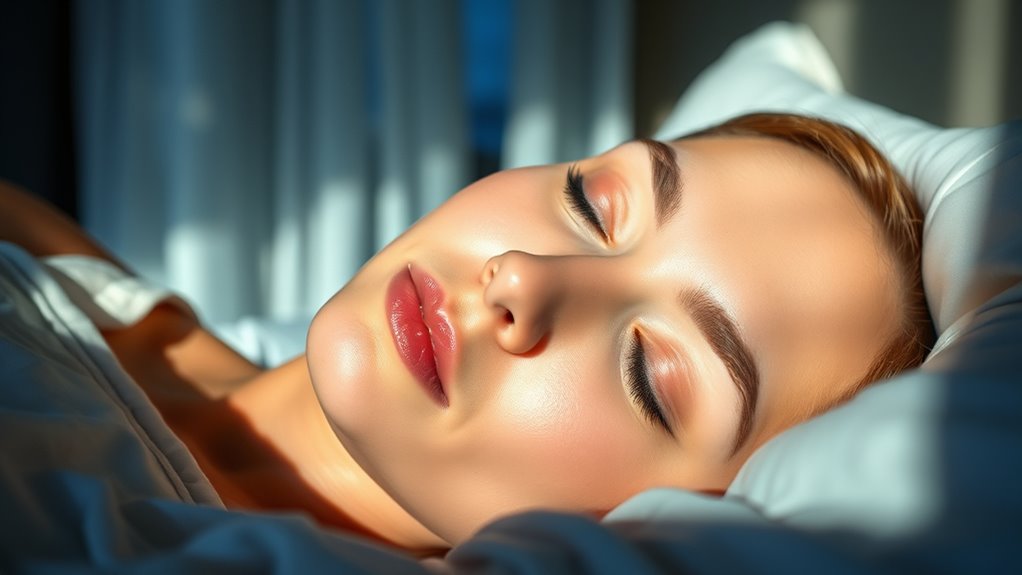Getting enough sleep is essential for your skin’s health because it promotes cell renewal, boosts collagen production, and helps balance hormones that support elasticity and hydration. During sleep, your body repairs damage, reduces inflammation, and strengthens your skin’s barrier. Lack of rest speeds up aging and makes your skin dull and more vulnerable. If you want to learn how to optimize your nighttime routine for better skin, keep exploring the details below.
Key Takeaways
- Sleep enhances skin cell regeneration and collagen production, promoting firmness and elasticity.
- Adequate sleep supports hormonal balance, reducing inflammation and protecting skin from oxidative stress.
- Restorative sleep strengthens the skin barrier, improving hydration and decreasing sensitivity.
- Sleep deprivation accelerates skin aging, causing wrinkles, dullness, and loss of firmness.
- Creating a calming sleep environment and using targeted skincare boosts nighttime skin repair.
The Science Behind Skin Repair During Sleep

While you sleep, your body actively works to repair and regenerate your skin. During this time, cell regeneration accelerates as your skin’s repair mechanisms kick into high gear. New skin cells are produced to replace those damaged by daily exposure to environmental stressors. This process involves the breakdown of old, damaged cells and the synthesis of fresh, healthy ones. Your body prioritizes these repairs to restore skin’s strength and barrier function. Collagen production also begins to increase, although more prominently during later sleep stages. The repair mechanisms guarantee that your skin remains resilient and vibrant, minimizing signs of aging. Creating a personalized sleep environment can further enhance these skin repair processes. Additionally, maintaining proper skin hydration supports optimal cellular function during repair. By giving your body the chance to perform these essential processes, you support healthier, more youthful skin over time.
How Sleep Promotes Collagen Production and Skin Elasticity

During sleep, your body actively boosts collagen production, a vital protein that keeps your skin firm and elastic. This process, called collagen synthesis, occurs most efficiently at night. When your body rests, it directs energy toward repairing and regenerating skin, enhancing elasticity and reducing fine lines. To understand this better: natural skin repair is significantly supported by restful sleep, allowing your body’s regenerative processes to function optimally. Additionally, the release of growth hormones during sleep further promotes cell regeneration, contributing to healthier skin.
The Impact of Sleep Deprivation on Skin Health

When you don’t get enough sleep, your skin ages faster and loses its youthful firmness. Sleep deprivation also weakens your skin’s barrier, making it more vulnerable to environmental damage. Additionally, it promotes inflammation, which can lead to redness, irritation, and breakouts. Using modern toilet features like dual-flush toilets can help conserve water, indirectly supporting environmental health and reducing stress that can affect your skin. Incorporating air purifiers into your sleep environment can improve air quality, further supporting skin health by reducing airborne irritants. Moreover, understanding cybersecurity vulnerabilities related to personal data can help you stay vigilant about online privacy, which is essential for overall well-being. Emphasizing the importance of self-care techniques, such as proper sleep hygiene, can enhance your overall skin resilience and appearance.
Accelerates Skin Aging
Lack of sleep accelerates skin aging by increasing the formation of wrinkles and fine lines. When you experience sleep deprivation, your skin produces less collagen, the protein that keeps skin firm and elastic. Without enough restorative sleep, your skin’s repair processes slow down, leading to dullness and sagging over time. Sleep deprivation also heightens the production of stress hormones like cortisol, which break down collagen further and promote premature aging. Additionally, insufficient sleep impairs blood flow, reducing oxygen and nutrient delivery to your skin cells. This combination of factors speeds up the appearance of aging signs, making you look older than your years. Prioritizing quality sleep helps slow down skin aging and keeps your skin looking youthful and vibrant.
Impairs Skin Barrier
Sleep deprivation weakens your skin’s protective barrier, making it less effective at defending against environmental pollutants, bacteria, and irritants. Poor sleep hygiene disrupts your skin’s ability to regenerate and maintain its natural defenses. When your sleep quality suffers, skin hydration decreases, leading to dryness and increased vulnerability. Without adequate rest, your skin produces fewer lipids essential for barrier function, allowing moisture loss and irritation to set in. This compromised barrier can result in redness, sensitivity, and a dull complexion. Additionally, personality traits such as resilience and stress management can influence how well your skin recovers from damage. Prioritizing good sleep habits helps restore skin hydration and strengthens your skin’s defenses. Maintaining consistent sleep routines allows your skin to repair and reinforce its barrier, keeping harmful elements at bay and supporting overall skin health. Regular use of air purifiers with effective HEPA filters can reduce indoor pollutants that contribute to skin irritation and inflammation. Furthermore, advancements in automated systems within skincare devices are emerging to optimize skin repair processes during sleep.
Promotes Inflammation
Poor sleep doesn’t just weaken your skin’s barrier; it also triggers increased inflammation. When you don’t get enough rest, your body responds by amplifying its inflammatory response, leading to skin redness and irritation. This heightened inflammation damages skin cells and can worsen existing conditions like acne or rosacea. Sleep deprivation causes your immune system to overreact, releasing pro-inflammatory cytokines that contribute to swelling and redness. Over time, this persistent inflammation accelerates skin aging and dulls your complexion. Additionally, airless technology used in certain paint sprayers minimizes overspray and ensures a smoother finish, which is similar to how restful sleep promotes optimal skin appearance. By neglecting quality sleep, you’re fundamentally fueling a cycle of ongoing inflammation, which undermines your skin’s health and resilience. Ensuring proper sleep environment can help improve sleep quality and reduce inflammation. Creating a comfortable and consistent sleep routine supports your body’s natural healing processes and helps regulate this response, reducing skin redness and promoting a calmer, healthier appearance. Incorporating adequate hydration can further assist in maintaining skin elasticity and reducing inflammation caused by dehydration.
Key Hormones Activated During Nighttime Rest

During restful sleep, your body activates several key hormones that play essential roles in maintaining healthy skin. Melatonin regulation increases, helping to protect your skin cells from oxidative stress and supporting repair processes. This hormone also promotes skin hydration and elasticity, giving you a healthier glow. At the same time, cortisol fluctuations decrease, reducing inflammation and preventing skin breakdown. Lower cortisol levels during sleep allow your skin’s natural repair mechanisms to operate efficiently, helping with cell renewal and collagen production. These hormonal shifts work together to restore and rejuvenate your skin overnight. Additionally, understanding the importance of hormonal balance in the creative process highlights how focused rest and mental clarity can enhance overall well-being and skin health. Recognizing the role of AI in healthcare and other sectors underscores the importance of scientific advancements in promoting health and wellness.
Common Sleep Disruptors That Affect Your Skin

Stress from lifestyle habits, environmental factors, and digital devices can substantially disrupt your sleep quality, which in turn impacts your skin’s health. A poor sleep environment—such as excessive noise, light, or uncomfortable bedding—makes it harder to rest deeply. Similarly, irregular or rushed bedtime routines can prevent your body from winding down properly, leading to fragmented sleep. When your sleep is disrupted, your skin misses out on vital repair processes, resulting in dullness, puffiness, and breakouts. To support healthy skin, create a calming sleep environment and establish consistent bedtime routines that signal your body it’s time to rest. Avoid screens before bed, keep your room dark and cool, and develop habits that promote uninterrupted sleep. These simple steps can markedly reduce sleep disruptions that harm your skin. Additionally, incorporating trusted skincare products like Patchology eye patches and ice masks can help soothe and refresh your skin overnight. Understanding your sleep cycles and how they influence skin renewal can further optimize your nighttime skincare routine. Recognizing the importance of healthy sleep patterns can also help prevent early signs of skin aging and fatigue.
Tips for Enhancing Your Nighttime Rest for Better Skin

To improve your sleep and boost your skin’s health, start by establishing a consistent routine that signals your body it’s time to rest. Create a calming environment by dimming the lights and minimizing noise, making it easier to relax. Prioritizing quality sleep guarantees your skin gets the recovery it needs overnight. Incorporating good lighting practices can further enhance your nightly rest and skin regeneration. Using gentle, exfoliating skincare products before bed can also help remove dead skin cells and promote a healthier skin renewal process during sleep.
Establish a Consistent Routine
Establishing a consistent bedtime routine can substantially improve the quality of your sleep, which in turn benefits your skin. When you stick to regular sleep and wake times, your sleep cycles become more predictable, allowing your body to repair and regenerate effectively. Developing bedtime rituals, like dimming the lights or avoiding screens, signals to your brain that it’s time to wind down. This consistency helps you fall asleep faster and stay asleep longer, maximizing the skin’s nighttime repair processes. Over time, a fixed routine reduces stress and minimizes disruptions, leading to more restorative sleep. Remember, the key is sticking to your routine daily—your skin will thank you for the extra consistency and quality rest.
Create a Relaxing Environment
Creating a calming environment before bed can considerably enhance your sleep quality and, consequently, your skin’s health. To achieve this, focus on cultivating a serene space. Use soothing scents like lavender or chamomile to relax your mind and body. Opt for calming lighting that’s dim and warm, avoiding harsh or bright lights that can disrupt your melatonin production. Keep your bedroom tidy and clutter-free to promote peace and reduce stress. Consider incorporating soft textures and calming colors to make your space inviting. These small adjustments create a tranquil setting that signals your body it’s time to wind down, helping you fall asleep faster and enjoy deeper rest. A restful environment primes your skin’s nighttime repair process, making your sleep more restorative.
Prioritize Quality Sleep
A peaceful, well-designed sleep environment sets the stage for restorative rest, but maintaining consistent sleep habits is equally important for your skin’s health. Prioritizing quality sleep involves more than just hours spent in bed; it requires intentional habits. Try dream journaling each morning to track your sleep patterns and identify what helps you relax. Your sleep position also matters—sleeping on your back minimizes facial pressure and reduces wrinkles. Establish a regular sleep schedule, going to bed and waking up at the same times daily. Avoid screens before bed and create a calming routine to ease into sleep. These small steps improve sleep quality, allowing your skin to repair and rejuvenate effectively overnight. Better sleep directly translates to healthier, more radiant skin.
The Role of Skincare Products in Supporting Nighttime Repair

Since your skin actively repairs itself overnight, using the right skincare products can substantially enhance this natural process. Effective product application delivers targeted skincare ingredients that support cell renewal, hydrate, and repair damage. Choose products with ingredients like retinoids, peptides, antioxidants, and hyaluronic acid to boost nighttime repair. Proper application techniques ensure these ingredients penetrate deeply and function ideally. To maximize benefits, consider:
- Applying serums before moisturizers for better absorption
- Using gentle, upward strokes during application
- Opting for products suited to your skin type
- Incorporating products with active ingredients proven to promote skin renewal
Frequently Asked Questions
How Long Does It Take for Skin Repair to Occur During Sleep?
When you sleep, your skin begins repairing itself almost immediately. Cell renewal and collagen synthesis ramp up during deep sleep stages, typically peaking around 7-9 hours. This process can take several nights to see noticeable improvements, as your skin rebuilds damaged cells and boosts elasticity. Consistent, quality sleep accelerates this repair, helping you wake up with healthier, more vibrant skin.
Can Certain Sleeping Positions Improve Skin Regeneration?
Your sleeping position can influence skin regeneration by affecting face hydration and minimizing friction. Sleeping on your back keeps your face away from pillow materials that may cause irritation or creases. Choose pillows with smooth, breathable fabrics like silk or satin to reduce friction and moisture loss. This helps your skin repair more effectively overnight, supporting healthier, more radiant skin by preventing sleep lines and promoting better hydration.
Does Sleep Quality Affect Different Skin Types Differently?
Did you know that poor sleep quality affects skin types differently? As someone with dry skin, you might notice increased flakiness, while oily skin could become more prone to breakouts. Sleep quality impacts your skin’s ability to regenerate, so understanding your skin type helps tailor your nighttime routine. Prioritizing good sleep boosts your skin’s health, ensuring each skin type gets the repair it needs for a radiant, balanced look.
Are There Specific Foods That Enhance Nighttime Skin Repair?
You can boost your nighttime skin repair by eating nutrient-rich foods that support your skin’s health. Focus on foods high in antioxidants, like berries, nuts, and dark leafy greens, which help combat free radicals and promote healing overnight. Incorporate these into your diet regularly to enhance your skin’s natural repair processes while you sleep. Prioritizing antioxidant intake guarantees your skin gets the nutrients it needs for a healthier, more radiant glow.
How Does Ambient Temperature Influence Skin Recovery Overnight?
Imagine your skin as a delicate flower, blooming best in just the right conditions. Ambient warmth encourages your skin’s recovery, helping cells regenerate smoothly. But temperature fluctuations can disrupt this process, causing stress and slowing healing. When your environment stays comfortably warm and stable, it creates an ideal atmosphere for your skin to repair overnight. Keep the temperature consistent to support excellent skin recovery and wake up feeling refreshed.
Conclusion
Prioritize your sleep to nourish your skin, repair your damage, and restore your glow. Embrace restful nights to boost collagen, enhance elasticity, and fight off the effects of stress and aging. Let your bedtime be your beauty ritual, your moment of renewal, your secret to vibrant skin. When you commit to quality rest, you’re not just sleeping—you’re investing in a healthier, more radiant you. Sleep well, glow brighter, and face each day with confidence.










